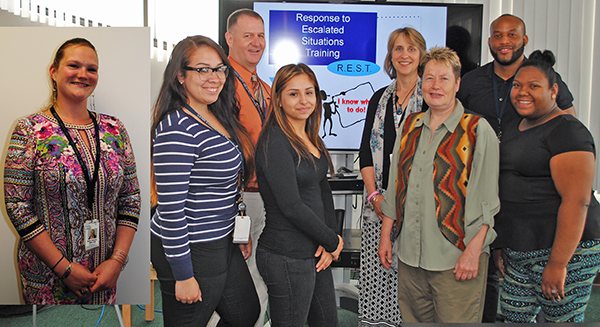A safety training program aimed at helping healthcare staff respond to disruptive and threatening patient behavior led to improved safety for both staff and patients, according to a recent evaluation report completed by the Labor Management Project’s research team. The program was developed by partnership forged by Union Hospital/North Shore Medical Center (Union Hospital), Lynn Community Health Center (LCHC), 1199SEIU and the Massachusetts 1199SEIU Training & Upgrading Fund (TUF).
The process began with a robust needs assessment process to identify the workforce skills required to manage the increasingly aggressive and behaviorally complex patient population seeking care at LCHC and Union Hospital. The findings confirmed the need for safety training, and provided details about the challenges posed by patients with behavioral health diagnoses and the behaviors that were especially problematic for staff.
Nearly 600 people participated in the safety training project, which was entitled Response to Escalated Situations Training (R.E.S.T.). At its core was a day-long session targeted to employees who lack the skills to manage disruptive patients. Among other topics, they learned about the stages of escalation, de-escalation techniques appropriate to each stage, behaviors that “trigger” certain reactions in certain types of patients, patient behaviors that may trigger reactions in staff and when to refer a patient to other staff. The training stressed the role frontline staff play in diffusing escalating situations, and how quickly difficult situations can change for the better by applying a few key de-escalation techniques.
The R.E.S.T. training was extremely well received by participants, with many indicating that they found their newly learned skills to be very valuable in their day-to-day work. According to the 26-page evaluation, the vast majority of R.E.S.T. survey respondents reported that they were more knowledgeable about the management of disruptive and threatening behaviors. At least 96% of those surveyed agreed or strongly agreed that they were able to recognize triggers to violence, identify the different levels of escalation, use cooperative language to diffuse escalating situations, and ensure the physical well-being of themselves and others. Furthermore, 98% of respondents agreed or strongly agreed that they have become active listeners.
The skills imparted during the training and used at the workplace led to improved safety for both staff and patients. The program improved relationships and helped to build teamwork, with staff using common language and practices, and working together to address agitated, aggressive, and/or violent patients. Respondents also noted that the skills are useful with colleagues, thus creating a calmer work environment.
R.E.S.T. was funded by a Health Care Workforce Transformation Fund grant through the Commonwealth of Massachusetts, Executive Office of Labor and Workforce Development. The grant program is administered by Commonwealth Corporation. For more information or questions about R.E.S.T., please contact Eileen Haggerty, Field Supervisor, at the Massachusetts 1199SEIU Training & Upgrading Fund.
